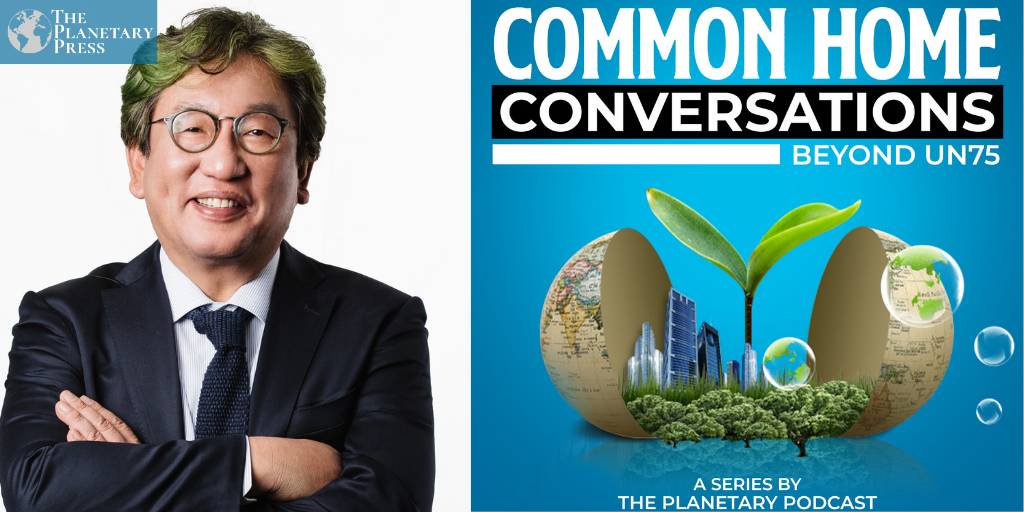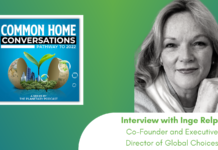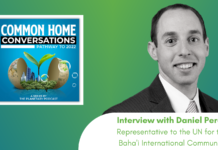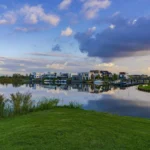Interview Transcript
Transcribed by Otter AI
Kimberly White
Hello and welcome to Common Home Conversations. Today we are joined by Professor Kim Sang-Hyup, Founder of the Coalition for Our Common Future, President of the Jeju Research Institute, and visiting professor at the Graduate School of Green Growth at KAIST. Thank you for joining us today! So, you were appointed as the Blue House Future Vision Secretary in 2008 and contributed to Korea’s historic low carbon green growth vision. Later in 2011, you became the Senior Secretary to the President for Green Growth. Please tell us more about these experiences.
Professor Kim Sang-Hyup
Yeah, well, to make a long story short, the low carbon green growth was a new paradigm of Korea. And the idea is very simple. It is about combating climate change very aggressively and ambitiously and also transforming the challenges by climate change into new opportunities. We thought we could have double-digit trillion opportunities by achieving low carbon green growth worldwide, not to mention Korea. And it was announced in the year 2008, in celebration of Korea’s national independence day, that was in August. But only a month later, if you remember it, the Lehman Brothers filed for bankruptcy. And then, the global financial crisis began all around the world. So only a month later, after the proclamation of low carbon green growth of Korea, many people said Korea would be the fastest sinking ship, even before it started the new national vision. However, the President of Korea at the time, Mr. Lee Myung Bak, thought differently. We fought that with the New Deal projects. It was about a $50 billion scale stimulus package, but that was to prepare the future low carbon infrastructure. It was about creating a resilient water infrastructure. It was about creating green energy infrastructure and transport structures. By exercising that large scale stimulus package in the name of the Green New Deal, we created more than 700,000 jobs. And also, it created a great enhancement of green technology competitiveness. But what was really important, by exercising that Green New Deal measure, we set up a target for the first time throughout the Korean industrial history, a target to cut greenhouse emissions that was minus 4 percent cut by the year 2020. And throughout the Green New Deal, Korea could reduce the emission growth rate from 10 percent, that was in 2010. In 2012, it went down to almost zero. That was a remarkable achievement. And besides that, we also tried to institutionalize Green Growth not to be hindered by the political regime change. So we laid out very important legal frameworks. A basic act for low carbon green growth, an act for green buildings, an act for smart grid, and more than anything else, we made a legal framework for emission trading scheme. That was the first of its kind in Asia that was later on followed by China. And also, we try to institutionalize our Green Growth efforts. That’s how we came up with the new international organization, the Global Green Growth Institute, that was initiated by Korea and many countries of like-minded groups.
We could also host the GCF headquarters, one of the very important new architecture of the UN. GCF stands for Green Climate Fund. We competed with Germany and Switzerland, but I believe we hosted the headquarters of GCF. So we institutionalized and we internationalized Green Growth during the period of my service at the Blue House. But politics always matter after the political regime change. The succeeding government didn’t seem to like the Green Growth very much. So it didn’t continue well. And the emission growth rate began to go up. That’s not a happy story. But I will tell you later, but we have a Green New Deal, again, facing the pandemic crisis. So I do think we still have hope. Yeah, that’s how I remember our efforts in the term that I worked for the public community in Korea.
Kimberly White
Well, that’s really impressive. I think a lot of us can relate to the regime change when environmental efforts aren’t necessarily always supported. And we must have that political will to recognize climate change and take action because it’s affecting all of us. So it’s essential without a doubt. You are also the Founder of the Coalition for our Common Future. Can you tell us more about this initiative?
Professor Kim Sang-Hyup
Yeah. Thank you very much for asking that question. You know, Our Common Future itself is the title of the very famous report, which is the Brundtland report on sustainability that was back in 1987, more than 40 years ago. So Our Common Future is a widely known subject to many people in the world. But the Coalition of Our Common Future reflects the idea that our efforts should be interconnected all around the world. That should be connected. That’s why I picked the name coalition, solidarity, whatever you may say. So we need more cooperation around the world. That’s the meaning of the social entity for Our Common Future. And there are two important signature projects, or you can call it lighthouse projects. One is the Green Big Bang projects. The idea is to have green energy, green mobility, and green technology work together in a very interoperable way and to move faster and bigger. That’s for creating a new industrial ecosystem in a low carbon manner. The other important project is the project for the young generation; we call it Voice from the Young. Because I believe young generations are the real stakeholders in this era. We are trying to empower young generations and give them chances to be real stakeholders, and hopefully, decision makers. And Climate Scouts is one of the projects reflecting that spread. We are nurturing university students and supporting young students to help younger people, elementary school students through the learning relay process. That’s one of the projects the Coalition for Our Common Future is doing. And I think that is exactly in line with the initiative of the Common Home of Humanity.
Kimberly White
I love what you’re doing, and I think we see the youth really speaking up these days. So it’s great that you’re working with them and working with them on climate and empowering them for those future decisions. That’s fantastic. So how would the proposal from the Common Home of Humanity help achieve these goals and contribute to the realization of a sustainable future?
Professor Kim Sang-Hyup
Well, you know, when somebody breaks into your home, then he should be, he should get some penalty. Is that right?
Kimberly White
Yes. Yeah, definitely.
Professor Kim Sang-Hyup
Yeah, yeah, if somebody breaks into your home, then he will be heavily penalized. But yeah, I actually think that the earth system is our home. And the idea is really appealing. The diplomatic negotiations on climate change began in 1995, in the name of the Conference of Parties, that was held in Berlin, Germany. And I attended the Conference of Parties, the Copenhagen Climate Summit in Denmark in 2009, since then I have never missed the Annual Conference of Parties on Climate Change.
Kimberly White
That’s impressive.
Professor Kim Sang-Hyup
Yeah, yeah. But during those 25 long years of diplomacy on climate change, yeah, we have a Paris Agreement on climate change. That is really a remarkable thing. But to my sorrow, with that agreement, our global greenhouse gas emissions are still increasing. This year is an exception due to the coronavirus, maybe about 6 or 7 percent minus. And it’s not because we made the right political choice, it is because of the pandemic we didn’t invite. Having said that, what is it? What does it mean, the Conference of Parties? What are the parties? To the international law and international system, the parties are just a nation-state, sovereign nation-state.
And let’s think about it. Are sovereign nation-states truly interested in combating global climate change? Maybe and maybe not. But if you look at history, nation-states are born to protect the self-interest of territory, something like that is not designed to combat the global commons, such as climate change. So we need a new approach. And that’s why I strongly bind with the spirit of the CHH, the Common Home of Humanity, embracing global commons as our true common problem.
So, in that regard, this is the very high time for us to give serious thought to giving sovereign subjects on the earth system itself, the best legal entity, to our planet. Yes, so that’s the virtue of the CHH. It’s not going to be easy at all, but we should do it. We must overcome this kind of respective individual self-interest of national actors around the world by having a broader, bigger, comprehensive concept. That is, in my eyes, what CHH is trying to do.
Kimberly White
Absolutely. And I think with the climate crisis, and now COVID-19, we see that these big global issues, they don’t recognize borders, they don’t recognize territories. So it’s essential that we have a legal framework that recognizes our Earth system, as you know, not something that’s so divided up. So speaking of climate change, can you tell us how the climate crisis is impacting Korea? And can you share some examples of what you’re seeing?
Professor Kim Sang-Hyup
Yeah, of course. In general, Korea’s temperature rise is about two times higher than the world average. And the sea level rise is also about two times higher than the world average. And Jeju, in which I am living, is exposing the very vivid dramatic case of climate change that is affecting Korea. Well, I wonder if you heard about the binomial name, Abies Koreana, which is a kind of Korean Christmas tree. Those trees are growing largely, lots of Korean Christmas trees are growing in the Hallasan mountain of Jeju. And many countries are really fond of Korean-style Christmas trees, which is a kind of needle-leaved tree. I was really shocked to learn many Korean Christmas trees are dying. They’re withering away due to climate change. It was a very shocking, crappy story, which I recently learned. And about a month ago, I experienced typhoons, which is a Korean hurricane. Within just ten days, I experienced three Korean typhoons. And one of the strongest was known as Maysak. In one day, the amount of rainfall was more than 1000 millimeters. In some parts of the Jeju area, the rainfall amount was about 1000 millimeters, which is more than half of Korea’s annual rainfall. Yeah, so we are experiencing extreme cases of weather due to climate change. And another thing, you are living in Florida, right?
Kimberly White
Yes.
Professor Kim Sang-Hyup
And Jeju has a very wonderful seaside. We have a wonderful sea around Jeju Island. You know for your information Korea belongs to a mild temperate climate region. But nowadays, Korea is turning into a semi-tropical region. In the case of Jeju under the sea, frankly, I’ve never been on a dive under the sea, but according to experienced divers, we are seeing a kind of tropical marine scene under the sea due to climate change. And so Jeju is turning into a tropical area. And according to the recent IPCC report, IPCC, as you know, the Intergovernmental Panel on Climate Change, from the mid 21st century, this century, there will be no winter in Jeju. We are going to have a long summer and a very short spring and fall. Korea used to have a very clear cut four seasons. Spring, summer, fall, and winter. Fall is my favorite season. But we are going to no longer enjoy the four seasons anymore. That’s so sad. Yeah, that’s what I’m experiencing.
Kimberly White
That is sad. I used to live in Alaska. So I’ve seen drastic climate change in both Alaska and Florida. And you mentioned the Christmas trees. In Alaska, we’ve seen vast expanses of spruce trees die because of spruce bark beetles. And the reason for that is climate change. As the winters became milder, it allowed the insects to flourish and expand their territory.
Professor Kim Sang-Hyup
Yeah, that’s true. How is the sea in Florida? Is the coral okay? Is it now turning white? How’s the seaside? How’s the sea of Florida where you live?
Kimberly White
We are seeing some coral bleaching and we’re seeing some other major impacts with an increased frequency of hurricanes and flooding. Sea level rise is a major issue here. Some studies have indicated that Florida has more to lose from sea level rise than anywhere else in the country. We’re seeing a big increase in algal blooms, too, and that is caused by another big issue we face, nutrient pollution, and exacerbated by climate change.
Professor Kim Sang-Hyup
I’m conducting an interview with you.
Kimberly White
I know, we switched spots here- what happened? Well, let’s get back into what you’re seeing. During the Korean National Assembly earlier this year, 98 percent of your nation’s local governments declared a climate emergency, the largest declaration of its kind to date. What are your thoughts on this declaration? And how will this help drive climate action moving forward?
Professor Kim Sang-Hyup
Well, politicians are very good at speaking good words, but not very good at real actions. And I think that is not an exception in Korea. Well, as I briefly told you earlier, Korea came up with a very large scale new deal projects in the name of Korea’s New Deal. That is more than a 100 billion US dollar scale. And almost half of them are about the Green New Deal. I call it the second round of Green New Deal. But up until now, the Green New Deal has no emission reduction target yet. It only aspires to vote with the net-zero carbon of the international community. So I would be really happy if the Korean government, along with the National Assembly, come up with the real target for the Green New Deal. That’s what I would like to see. That’s where I would love to join. As the head of the UN, Mr. Guterres, has rightly pointed out the substantial solution to this pandemic is to create a clean and green transition for our sustainable future.
So in that regard, we, not just Korean lawmakers or Congressmen, all of us should come up with a real target that is aligned with the net-zero global goals. That’s what I would like to see.
Kimberly White
Absolutely, and I think worldwide we need to see that. So I know you dove into this a little bit earlier, but I want to get back into it because I think that what you’re working on is such a unique initiative. In your role as President of Jeju Research Institute, you’ve been working on some new green policy. Can you tell us what the Green Big Bang is and what you’re hoping to accomplish?
Professor Kim Sang-Hyup
Yes, I’m closely working with the Jeju Governor Won Hee-Ryong for that. And the idea of Green Big Bang, as I told you, it’s very simple. We just need to move faster and bigger and now like a big bang, like the big bang, the birth of the universe. So we really should be really, really fast and aggressive and ambitious. And Jeju is the case. Jeju has set up a carbon-free island by 2030. Here what I mean carbon-free is simply the same as carbon neutral. And how can we achieve that? Jeju is going to replace all the vehicles into electric vehicles and eco-friendly vehicles. More than 300,000 vehicles are running in Jeju. And to achieve that, by 2030 internal combustion engines will be prohibited. New registry of the internal combustion engine will be banned. And we are going to produce all the energy with renewables, yes 100 percent renewables. That was announced at the Paris Climate Summit. And throughout the Green Big Bang audacious efforts during those five years, more than 20,000 electric vehicles are now running in Jeju. It started from almost scratch. And the renewable energy penetration rate is about 15 percent. We can say that the numbers are not enough to accomplish carbon zero by 2030, but that’s why we are so glad to see another round of the Green New Deal.
Throughout this opportunity, about $10 billion will be invested, including private investment. And new technologies and new approaches will be applied. For example, we are going to introduce V2G next year. V2G means vehicle to grid. In Jeju, we have developed a smart grid system. If we introduce V2G, vehicle to grid, then the electric vehicle will upload electricity when the electricity tariff is high, playing as a kind of peak time management player. And when the electricity tariff is low, then the electric vehicle will download electricity from the grid. So that’s how you strike a balance in a green way. And also, Jeju’s going to build an infrastructure for new mobility, etc. And there are many, many stories I’d like to share with you. But that would be too lengthy, but by taking advantage of Korea’s Green New Deal, Jeju is going to be a new frontier for carbon-free or carbon-neutral, net-zero carbon society. Yeah, that’s what Green Big Bang in Jeju is about.
Kimberly White
That is very impressive, and I’m interested in the vehicle to grid. I think that sounds really cool. And this is definitely something I think we need to see a lot more of, so you guys are really leading the way.
Professor Kim Sang-Hyup
Well, Korea is rather good at moving fast. So once we really set up a good direction, I am sure Korea can move fast, and Korea has developed very good digital and ICT technologies. This is the time when energy and mobility meet together with that kind of heightened technology. And I think Korea can do that if it is really determined and set a kind of example for the world community. And to do that, as you pointed out, political will does matter. We can mobilize, we should, and we can mobilize all the resources.
Kimberly White
Excellent. Yeah, I think it’s great and definitely an example for the global community to follow. I’m excited to see how everything plays out and to follow your work on Jeju Island. The next question I have is on the Common Home of Humanity. What do you think the global pact for the environment should address? And in your opinion, how will the proposal from the Common Home of Humanity better address the climate crisis?
Professor Kim Sang-Hyup
Well, as you know, there is no global, central authority. There is no global hierarchy, there’s no global government to deal with this kind of unprecedented existential challenge that is climate change. Having said that, yeah, we have a Paris Agreement that is great. Even a professor or expert like Daniel Yergin, one of the most important experts on energy, says, the world history will be divided before Paris and after Paris. But to my eyes, the Paris Agreement is wonderful, but that’s not enough. And we should integrate all the important parts of the environmental agenda. So that’s the beauty of the global pact for the environment. And which to my eyes should go beyond the borders, as you mentioned. But if you look at the reality of the international political system that is governed by sovereign nation-states, it is not easy at all to achieve that global environmental pact. That’s why the movement led by civil society like CHH is really important.
So at this moment, I think, let the citizens of the world know much better and much deeper about the initiative about the cause of the CHH, including the media you are in charge of.
The world is scattered. And the role of CHH is to integrate those scattered dots together. And to raise public global awareness is really important at this stage. And to my knowledge, it is aligned with the UN75 movement. It’s a good sign, it’s a good sign. So two years later, maybe in 2022, we are going to celebrate that meaningful Stockholm conference. Looking at the time spent, we should appreciate every member of the UN and not just the UN but all the citizens of the world to know better the CHH.
And to achieve the goal, I think the planetarization of consciousness is truly important. And to achieve that, we may need a kind of new school for planetary consciousness. Seven years ago in Korea, we set up a great new school of green growth, KAIST. KAIST is one of the best universities, not just in Korea but in East Asia. But that’s just the beginning. I would like to see CHH exercised more powerfully in terms of global public awareness, and I will be in line with that. In early November, we are going to hold the Jeju Forum, which is quite well known in Asia.
And throughout the Jeju Forum, I’m going to organize a session for the CHH and also for the Coalition for our Common Future. In other words, simply put, we must cooperate together in the end to achieve that global environmental pact.
I don’t think it will be resolved in this decade. It may require two or three more decades to achieve that global treaty, global pact. Anyways, we should start right now, if not now, then when? Okay, that’s how I view, and I greatly admire the efforts being done by CHH, including the Planetary Press, the CEO, Kimberly White.
Kimberly White
Thank you for that and for your efforts as well! Do you have anything else you’d like to share with our audience?
Professor Kim Sang-Hyup
Oh, yeah, yeah. Yeah, let me remind you, the famous line that was done several decades ago. If not now, then when? And if not us, then who? And that’s the line. I like to remind you. Let’s do it together.
Kimberly White
All right, and there you have it. History shows us that nation-states are born to protect the self-interest of territory, not to combat issues such as climate change that impact our global commons. While it might not be easy, we need a broader, more comprehensive approach and a new legal framework that embraces our global commons, allowing us to face these unprecedented challenges together. That is all for today, and thank you for joining us for this episode of Common Home Conversations Beyond UN75. Please subscribe, share, and be sure to tune in next week to continue the conversation with our special guest, Hindou Ibrahim, President of the Association for Indigenous Women and Peoples of Chad. And visit us at www.ThePlanetaryPress.com for more episodes and the latest news in sustainability, climate change, and the environment.
For more episodes, visit Common Home Conversations Beyond UN75







